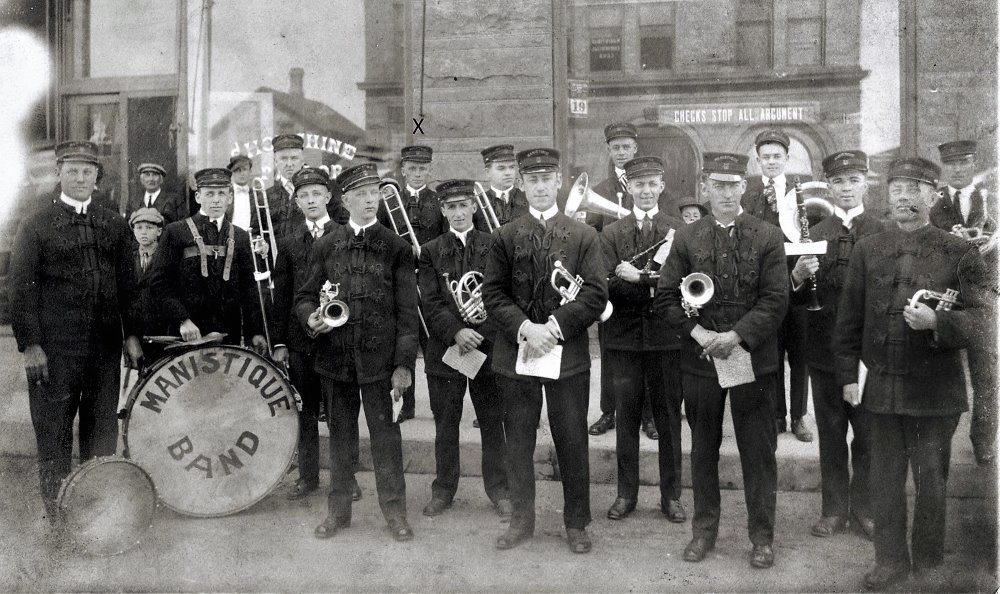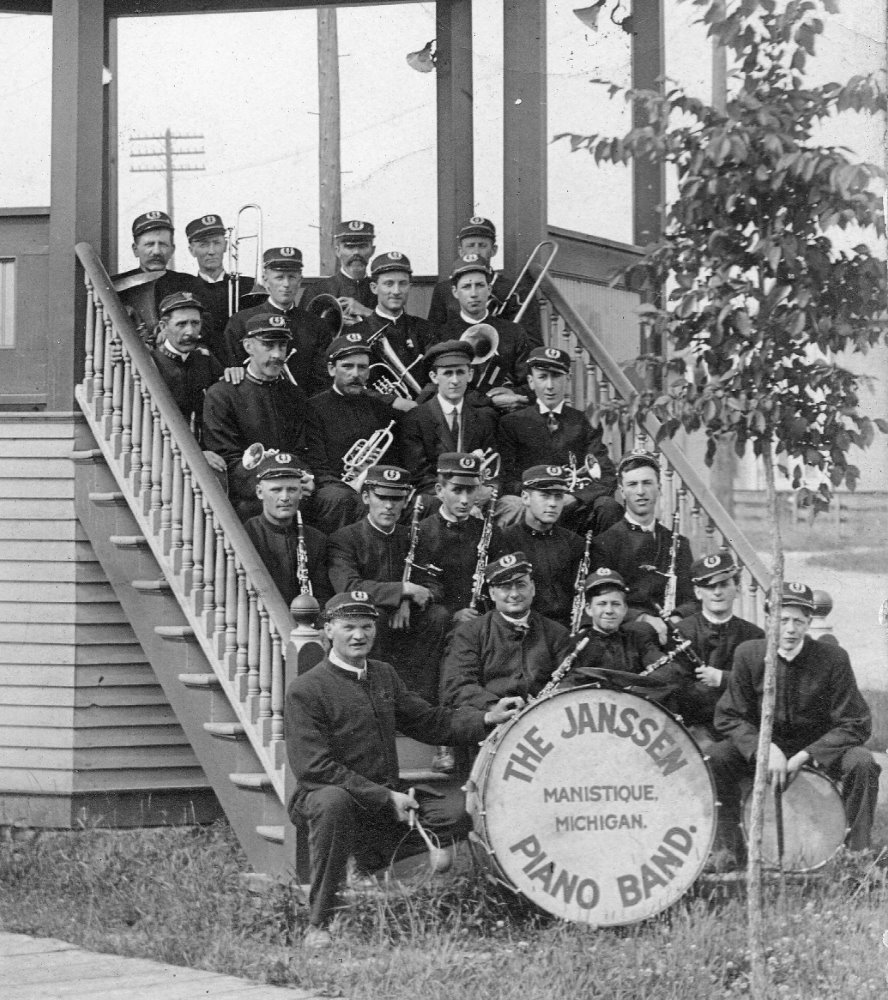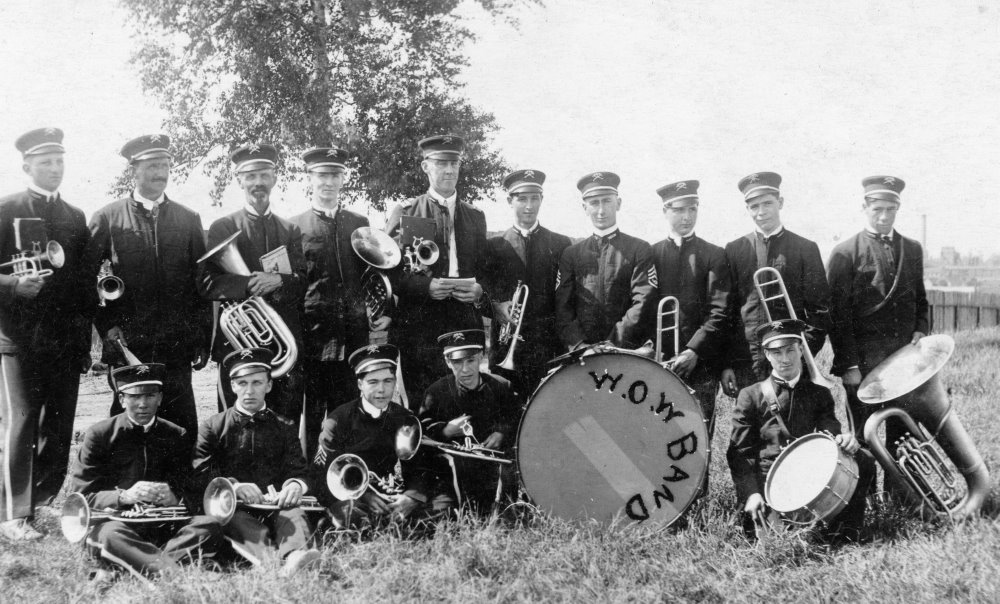
The Manistique Band poses in front of the Manistique Bank Building, with a reflection of the First National Bank across the street showing in the window. Trombonist John Nich is identified by the X above his cap. Photo courtesy William Nich, Wakarusa Indiana Tribune.
The early decades of the 20th Century marked the heyday of Manistique bands. Support for musical entertainment thrived in Manistique, and the town earned a reputation for good band music. Recruiters wooed especially talented musicians from other cities to come to Manistique and found jobs for them in one of the city’s many industrial plants.
Manistique’s two opera houses hosted travelling theatre troupes that relied on local talent to provide music to augment their performances. Manistique musicians performed frequently at the opera houses and later at the Gero Theatre. Bands that featured prominently in that era were the Manistique Band, the Woodmen of the World Band (known as W.O.W.) and the Janssen Piano Band. Orchestras that included both strings and wind instruments also flourished with groups such as Todd’s Orchestra and the Country Club Orchestra performing regularly at dances and home talent shows. Patriotic holidays and county fairs always included the lively music of a brass band.

A 1910 image of the Janssen Piano Band posing on the steps of the band stand. The band received $10 for including Janssen Piano in their name. SCHS photo
W.O.W. bands began as insurance lodges with dues of 70 cents purchasing $1,000 of insurance. The Woodmen of the World band in Manistique numbered 15 members in 1916, but had increased to 25 musicians by May of 1917, when it escorted Schoolcraft County’s first contingent of World War I volunteers to the Soo Line Depot. The musical march to the train station was the beginning of a long journey, that for many ended on the battlefields of France.
Manistique bands and orchestras were kept busy during the roaring twenties. It seemed that almost any event could be improved with the addition of a brass band. The arrival of the Goodrich steamer Indiana in June of 1926 was ample cause for celebration. The W.O.W. band was playing at the dock when the boat arrived along with a delegation from the Chamber of Commerce. The ship’s stay in Manistique lasted just three hours before it sailed out of the harbor bound for Mackinac Island. The W.O.W. band was also on hand in 1928 for the dedication of the airfield at Blaney Park.
Summer evenings in downtown Manistique often included a band playing somewhere in the city. Favorite locations for the bass bands to hold their weekly concerts included Triangle Park, the portico at the Elks Temple and the band stand in front of the C-L Hardware, across from the school. The crowds were entertained with a mixture of classical music along with popular favorites such as “Alexander’s Ragtime Band,” “Blue Hawaii.” Anchors Aweigh” and “The Waltz You Saved for Me.”
Political events provided another opportunity for the bands to perform. The 1928 Presidential contest between Herbert Hoover and Al Smith was a prime example. On October 22, 1928, both the Republicans and Democrats held rallies in Manistique to encourage their followers to get out and vote in the upcoming November election. The political speeches along with the music of the brass bands helped to inspire the party faithful. The W.O.W. Band entertained the Republican followers, while the Manistique Band serenaded the Democrats. Later that week, the Democratic party held a second rally in support of their nominee, Al Smith. This time, the W.O.W. band entertained the Democrats with several selections, including their campaign song, “The Streets of New York.”

A 1916 image of the Woodmen of the World Band at the County Fair Grounds. SCHS Photo
A unique feature of the Woodmen of the World band was their annual boat tour on Lake Michigan. The band boarded the Ann Arbor Car Ferry and travelled down to Frankfort in lower Michigan. From there, they boarded the ship “Puritan” that would take them to Chicago. The W.O.W. musicians entertained at every port of call along the way. From Chicago, the band members made their way to the W.O.W. campsite at Rolling Prairie, Indiana, for a three-day retreat. The W.O.W. bands from the various towns competed against each other both musically and through drill maneuvers and sporting events. The lake tour took place every summer during the 1920s and lasted nine days including travel.
The Gero Theatre provided a venue for home talent following their presentation of feature films. The city’s brass bands regularly held concerts at the Gero that were popular and well attended. The W.O.W. band also performed vaudeville skits which were greatly enjoyed by Manistique audiences. The W.O.W. actors performed 3-act comedies that almost always included musical accompaniment. In a sad commentary on the times, in 1928 the W.O.W. presented the comedy “Deviled Crabs” which included two black-faced impersonators.” Vaudeville plays and minstrel shows that depicted hurtful racial stereotypes were performed in theatres across America during the 1920s, and reflected the prejudices prevalent in that time.
Holiday parades afforded the opportunity for the bands to try to outperform one another. They went so far as to employ spotters to spy on one another’s rehearsals. The local populace benefited greatly from the abundance of musical talent and the hours spent in rehearsal. The W.O.W. band and the Janssen Piano Band continued to be active through the great depression of the 1930s. Attrition caused by the shrinking local economy in the great depression and World War II eventually led to the merger of the various bands. The formation in 1947 of the Manistique Band Association and the creation of the Manistique Municipal Band ushered in a new era in Manistique musical history.
